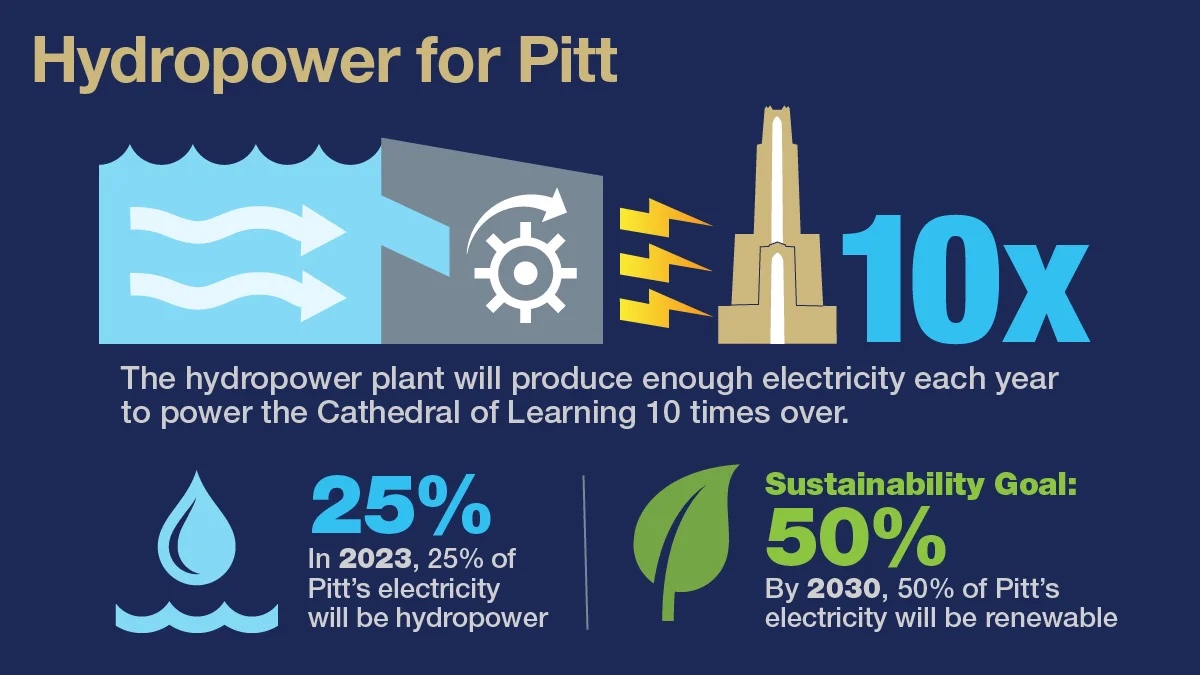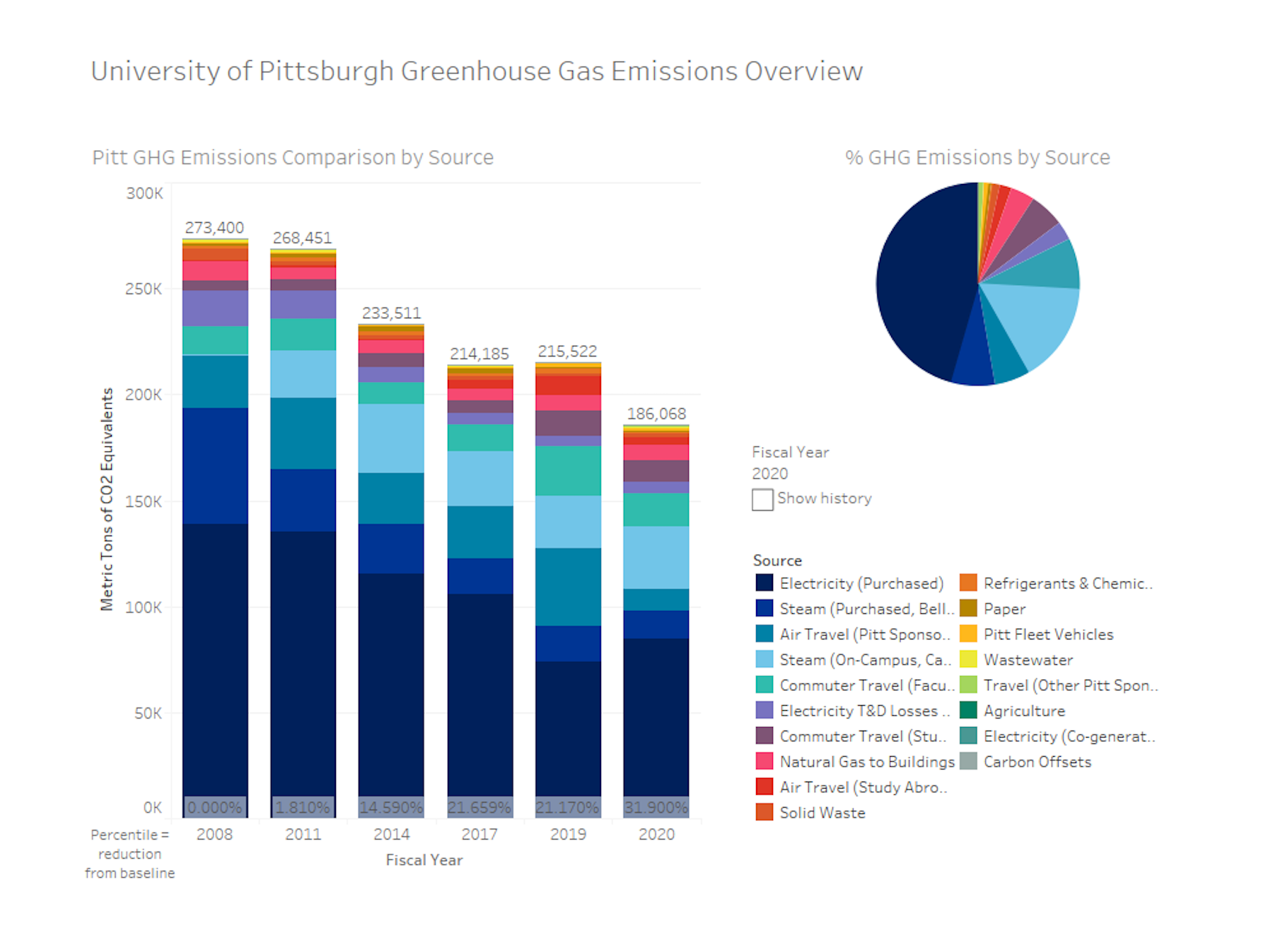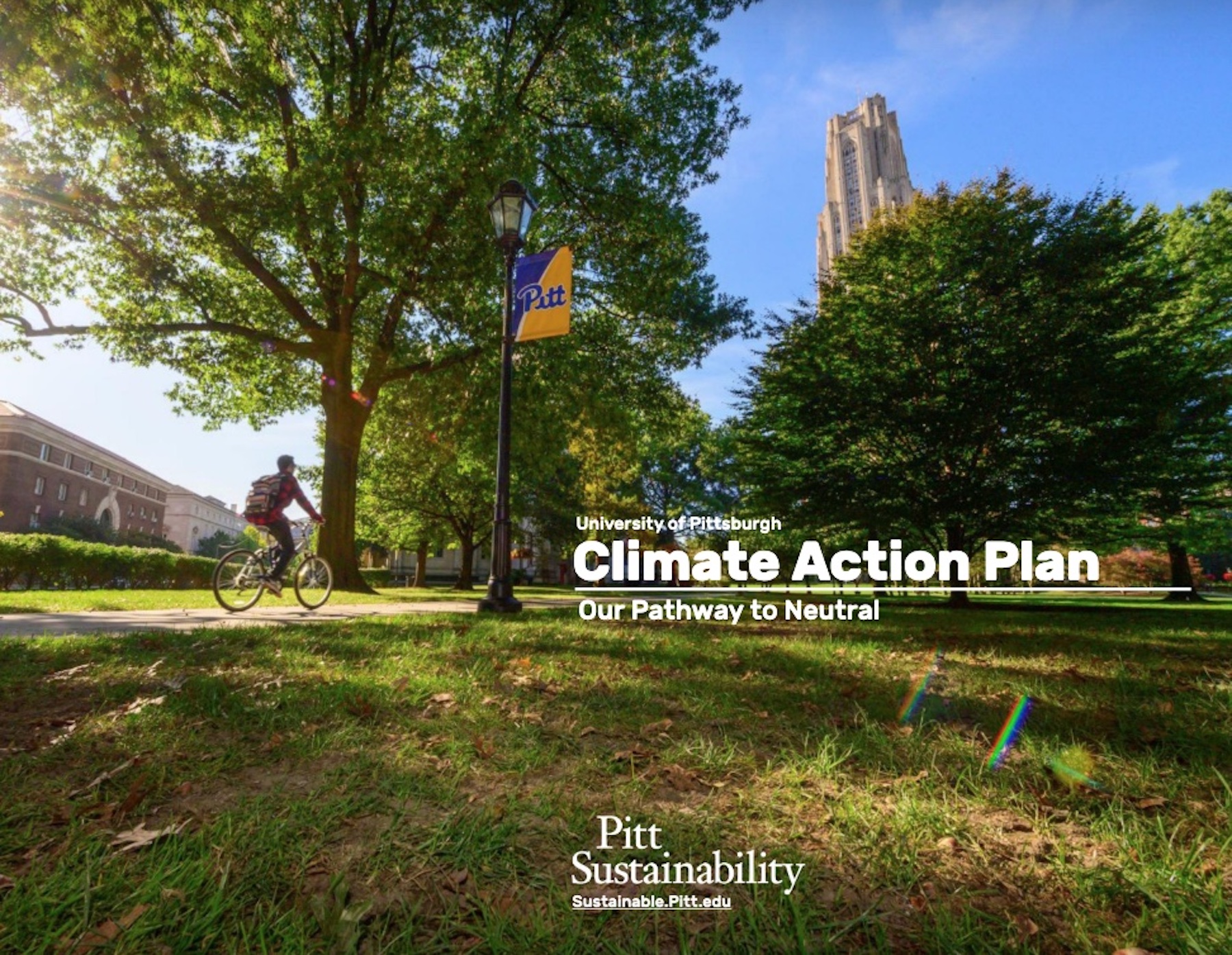The University of Pittsburgh has released the Pitt Climate Action Plan, detailing how the University will achieve its goal to go carbon neutral by 2037 through investments in clean energy, transportation, efficiency and other areas. By 2037, efforts detailed in the plan will result in a net reduction in annual emissions equivalent to taking more than 45,000 cars off the road.
AMBITIOUS GOAL RESTS ON 3 PILLARS
The report details three pillars for achieving 2037 goals: energy demand reduction; clean supply via renewable and clean energy investment; and low carbon connections via active, shared and low carbon mobility.
Planned investments in energy efficiency will decrease the use of utilities on campus, while investments in electricity generation, including agreements for local hydroelectric and solar power that are already underway, will help ensure that the energy the University does consume is clean.

Energy demand reductions from space use optimization, existing building efficiency, and new building performance will enable the university to avoid 27,100 metric tons of carbon dioxide equivalent (MT CO2e). Carbon emissions will be reduced by establishing and supporting low carbon connections for commuting and air travel through strategies such as shifting commuting modes to more active, shared, and low carbon choices; an increase in flex work arrangements, air travel reductions, and air travel offsets.
'NEED FOR URGENCY' IN 2037 GOAL
“The Pitt Climate Action Plan lays out our institutional climate action strategy for the University community and details how they can get involved,” said Pitt Director of Sustainability Aurora Sharrard, who also chairs the Carbon Commitment Committee of the Chancellor’s Advisory Council on Sustainability responsible for compiling the plan. “Many higher education institutions have set a 2050 goal. The 2037 goal recognizes the need for urgency in addressing the climate emergency, while also allowing for the longer-term planning necessary to pursue sustainable solutions”
Pitt has already made substantial progress in reducing its carbon footprint: The school’s most recent greenhouse gas inventory showed a 32% decrease in emissions between 2008 and 2020, thanks in part to a shift to cleaner steam plants and ongoing energy efficiency projects in campus buildings.

The committee will update the Pitt Climate Action Plan every five years, detailing and making public the ongoing work toward carbon neutrality at Pitt.
“We have a responsibility to our larger communities, both in Pittsburgh and our regional campuses, to ensure that we’re communicating what we’re doing as a thought and practice leader to help other institutions find their own way,” she said. “The global call is for carbon neutrality by 2050. It’s going to take a lot more than just us to get there.”
Related Stories
| Aug 11, 2010
SPRI expands membership to include green roof and photovoltaic component suppliers
SPRI, the association representing sheet membrane and component suppliers to the commercial roofing industry, recently approved a bylaw revision expanding its membership to include companies that represent emerging technologies, such as photovoltaic and vegetative roof components.
| Aug 11, 2010
LEED 2009 cites FloorScore Certification as indicator of indoor air quality
The U.S. Green Building Council (USGBC) has cited FloorScore® certified flooring products as eligible for credits under the new LEED 2009 Version 3 guidelines. Reflecting the inclusion of FloorScore, the new LEED IEQ Credit 4.3 for Low-Emitting Materials has been expanded from “Carpet Systems” to “Flooring Systems” to include hard surface flooring.
| Aug 11, 2010
CHPS debuts high-performance building products database
The Collaborative for High Performance Schools (CHPS) made a new tool available to product manufacturers to help customers identify building products that contribute to sustainable, healthy, built environments. The tool is an online, searchable database where manufacturers can list products that have met certain environmental or health standards ranging from recycled content to materials that contribute to improved indoor air quality.
| Aug 11, 2010
29 Great Solutions for the AEC Industry
AEC firms are hotbeds of invention and innovation to meet client needs in today's highly competitive environment. The editors of Building Design+Construction are pleased to present 29 "Great Solutions" to some of the most complex problems and issues facing Building Teams today. Our solutions cover eight key areas: Design, BIM + IT, Collaboration, Healthcare, Products, Technology, Business Management, and Green Building.
| Aug 11, 2010
Walmart establishes sustainable product index to evaluate 'greeness' of products
Walmart today announced plans to develop a worldwide sustainable product index during a meeting with 1,500 of its suppliers, associates and sustainability leaders at its home office. The index will establish a single source of data for evaluating the sustainability of products.
| Aug 11, 2010
Sika Sarnafil launches sustainable roofing resource website SustainabilityThatPays.com
Sika Sarnafil, the worldwide market leader in thermoplastic roofing and waterproofing membranes, today launched a new web site dedicated to supporting sustainability principals and environmentally responsible building. The streamlined site, SustainabilityThatPays.com &http://www.SustainabilityThatPays.com> provides the building owner with critical information on selecting roofing and waterproofing systems...
| Aug 11, 2010
9 rooftop photovoltaic installation tips
The popularity of rooftop photovoltaic (PV) panels has exploded during the past decade as Building Teams look to maximize building energy efficiency, implement renewable energy measures, and achieve green building certification for their projects. However, installing rooftop PV systems—rack-mounted, roof-bearing, or fully integrated systems—requires careful consideration to avoid damaging the roof system.
| Aug 11, 2010
USGBC’s Greenbuild 2009 brings global ideas to local main streets
Save the planet with indigenous knowledge. Make permanent water part of your life. Dive deep water for clues to environmental success. Connect site selection to successful creative concepting. Explore the unknown with Discovery Channel’s best known guide. These are but a few of the big ideas participants can connect to at USGBC’s Greenbuild International Conference and Expo, taking place on November 11-13, 2009 in Phoenix, Ariz.
| Aug 11, 2010
Free waterproofing and roofing resource handbook available from American Hydrotech
American Hydrotech is now offering a waterproofing and roofing resource handbook for all architects and design community professionals. Topics include sustainable design, waterproof product specification, and proper installation techniques for use by building professionals in designing and waterproofing roof decks, plazas, vertical foundations, reflecting pools, and green roof applications.







